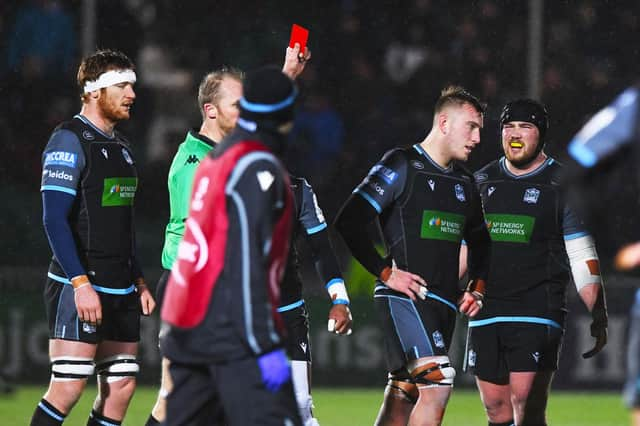Rainbow Cup: Players shown the red card can be replaced after 20 minutes


The sport’s governing body has given the green light to three law variations for the new tournament which is scheduled to begin next Friday, April 23.
As well as red card replacements, World Rugby has also sanctioned a ‘captain’s challenge’ and goal-line drop-outs in the competition which will be contested by Guinness Pro14 clubs and four South African Super Rugby franchises.
Advertisement
Hide AdAdvertisement
Hide AdThe three law variations have already been trialed in Super Rugby in New Zealand and Australia with mixed results.
The idea that teams will be allowed to replace players who have been sent off is the most contentious part of the experiment.
Teams will be able to use a nominated substitute to replace the offender after a 20-minute period. The player who is sent off will not be able to return to the pitch.
Players who have already been substituted for tactical reasons may return to replace the player who has received a red card.
With rugby in the midst of a crackdown on dangerous play which has led to an increase in red and yellow cards, the idea of players who are sent off being replaced will be seen by many as diluting the punishment to unacceptable levels.
However, David Jordan, the tournament director of Pro14 Rugby, believes the law trials can be innovative.
“Our belief is that we will see a positive impact on the game overall,” he said.
The idea of the captain’s challenge appears to have been borrowed from cricket and tennis, where players can challenge an umpire’s decision.
Advertisement
Hide AdAdvertisement
Hide AdIn the Rainbow Cup, captains will be allowed one challenge per match. During the first 75 minutes these can be used to review try-scoring and foul-play incidents but in the final five minutes the skippers will have the power to challenge any of the referee’s decisions, with the exception of scrum or lineout penalties.
“The Captain’s Challenge is aimed at enhancing the accuracy of decisions already under the remit of the match officials,” said the Guinness Pro14 in a statement.
The challenge will be referred to the TMO who will review the footage with the match referee making the final decision. If a challenge is successful, then the team keeps their challenge but if it is unsuccessful then the team loses the challenge.
Challenges can only be made up to 20 seconds after the referee has blown his whistle for a stoppage in play and only incidents from the last passage of play can be challenged. But TMOs will be able to go back to the last stoppage in play, regardless of how many phases have been played.
Footage must be ‘clear and obvious’ for a challenge to be upheld.
The third law variation to be trialed will see drop-outs taken from anywhere on the goal line for ‘held-up over the line’, knock-ons that occur in goal or when the ball is grounded by a defending player in the in-goal area after a kick through.
Edinburgh begin their Rainbow Cup campaign at home to Zebre on April 23, with Glasgow Warriors facing Benetton in Treviso the following day.
A message from the Editor:
Thank you for reading this article. We're more reliant on your support than ever as the shift in consumer habits brought about by Coronavirus impacts our advertisers.
If you haven't already, please consider supporting our trusted, fact-checked journalism by taking out a digital subscription
Comments
Want to join the conversation? Please or to comment on this article.